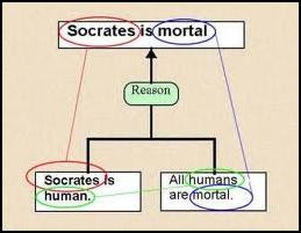
A formal argument in logic that is formed by two statements and a conclusion which must be true if the two statements are true.
At its most simple a syllogism is two statements that relate to one another and lead to a logical conclusion. A basic example is:
Most A-level students first come across syllogisms when they study the Ontological argument. Anselm, when he wrote Proslogion he lays out his argument in chapter 2 in a fairly verbose way:
Therefore, 0 Lord, You who give understanding to faith, grant me to understand— to the degree You know to be advantageous— that You exist, as we believe, and that You are what we believe [You to be]. Indeed, we believe You to be something than which nothing greater can be thought. Or is there, then, no such nature [as You], for the Fool has said in his heart that God does not exist? (Psalms 13:1 & 52:1(14:1 & 53:1)). But surely when this very same Fool hears my words “something than which nothing greater can be thought,” he understands what he hears. And what he understands is in his understanding, even if he does not understand [i.e., judge] it to exist. For that a thing is in the understanding is distinct from understanding that [this] thing exists. For example, when a painter envisions what he is about to paint: he indeed has in his understanding that which he has not yet made, but he does not yet understand that it exists. But after he has painted [it]: he has in his understanding that which he has made, and he understands that it exists. So even the Fool is convinced that something than which nothing greater can be thought is at least in his understanding; for when he hears of this [being], he understands [what he hears], and whatever is understood is in the understanding. But surely that than which a greater cannot be thought cannot be only in the understanding. For if it were only in the understanding, it could be thought to exist also in reality— something which is greater [than existing only in the understanding]. Therefore, if that than which a greater cannot be thought were only in the understanding, then that than which a greater cannot be thought would be that than which a greater can be thought! But surely this [conclusion] is impossible. Hence, without doubt, something than which a greater cannot be thought exists both in the understanding and in reality.” (https://courses.edx.org/c4x/MITx/24.00x/asset/AnselmProslogion2-5.pdf) |
However, it can neatly be summed up in this syllogism:
1. God is that than which nothing greater can be thought. |


 RSS Feed
RSS Feed
